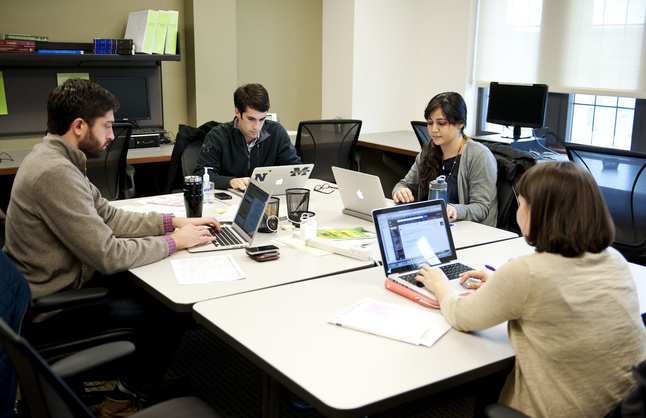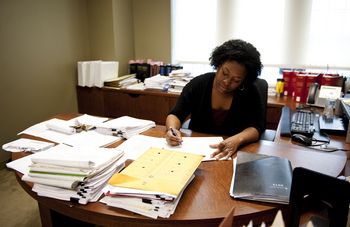U-M Law School joins the entrepreneurship game with free legal clinic for student startups

Third year law school students (from left, clockwise) Adam Miller-Howard, Joe Morrison, Sogoal Salari, and Jeana Buquicchio work in the Entrepreneurship Clinic in the school's new South Hall building.
Daniel Brenner | AnnArbor.com
Bryce Pilz is a co-instructor at one of the newer additions to the campus’ entrepreneurial ecosystem, the Law School’s Entrepreneurship Clinic. The clinic provides free legal advice and support to startup companies run by students.
“For the student entrepreneurs, this is huge,” Pilz said.
“They’re doing great things, and they’re extremely active with their startups, but there are big mistakes you can make in the early stages if you don’t have someone to help you.”
Sam Zell, whose name is already on the business school’s entrepreneurial institute, donated $5 million to help start the clinic as part of the Zell Entrepreneurship and the Law (ZEAL) program.
In addition to helping student entrepreneurs, the program and clinic benefit law students who hope to one day work in the startup sector.
“For the law school students, the clinic consists of two parts, a classroom component and then actually representing their clients,” clinic director Dana Thompson said.
“… Most of law school is about taking classes and learning about the theory of corporations or torts or contracts. Then they come to us so we can put everything together and they can actually work with a startup.”
The clinic utilizes the “student practice” rule, which allows law students to represent clients as long as a licensed attorney supervises them. Thompson said she and Pilz received more than 100 applications for 16 spots in the clinic’s first semester in the spring of 2012.
“It’s a great opportunity for us because it’s doing a lot of research and starting from scratch figuring out how to solve things,” third year law student and clinic participant Jeana Buquicchio said.

Entrepreneurship Clinic instructor Dana Thompson works at her desk in the Michigan Law School.
Daniel Brenner | AnnArbor.com
Students in the clinic said that working with student startup companies has ups and downs. “It’s nice having clients more or less in the same age group. You can really develop a rapport with them,” Sogoal Salari, also a third-year law student in the clinic, said.
“At the same time it can be very challenging with their personalities. They’re all students or recent graduates and have never held full-time jobs in the business world. We sometimes have to do a bit of handholding with legal and non-legal issues.”
Another student, Joe Morrison, said the companies being helped by the clinic have a wide spectrum of developmental stages and can present different challenges.
“We’re working with a bike-share company, A2B, that is really appreciative just for the chance to work with us and get the help and advice,” he said.
“Then another client, Fetchnotes, is in the TechStars program in Boston and is trying to raise a $1 million round of funding. So they sometimes need things done in under a week because they have a meeting with a potential investor. It’s a much higher pressure situation there.”
The clinic has 17 active client companies. Students in the clinic also offer office hours once a week at the Center for Entrepreneurship in the College of Engineering, the Zell Lurie Institute for Entrepreneurial Studies in the Ross School of Business, and the TechArb business incubator.
“At office hours, they come in and give us a specific problem,” Morrison said. “We try to give them the shortest answer you can to what is usually a huge question.”
A lot of the advice the clinic dispenses deals with entity formation and intellectual property rights. The co-founders of the A2B bike share program said the help was invaluable.
“The experience was terrific. They helped us form our company, and then over the summer Bryce [Pilz] continued to help us with legal matters,” co-founder Keith Porter said.
“Now in the fall we’ve just finished up our offering agreement and getting provisional patents filed.”
The benefits from the program for law school students in the clinic go beyond the hands on experience of helping young companies. They’re also treated to guest speeches from U-M alumni who are now at the top of the profession and are anxious for more Wolverines to follow in their footsteps.
“Hearing them talk about their experiences, you realize it’s a lot more about how you interact with people than just how you can read and understand the law,” Morrison said.
“Hearing from people who have made it what it takes to be a good first year associate has been one of the most valuable parts of any class I’ve taken here.”
Pilz said the advice offered by returning alumni can help law students realize that they don't have to follow what people consider to be the "traditional" career path of going to law school and becoming a lawyer. One of his favorite things about the program is that it opens doors and makes connections that would not have otherwise happened.
“There’s something magical about getting the smart ambitious business and engineering students in the same room as the smart ambitious law students,” he said.
“We’re now getting our students in the same room with them for the first time. The law school used to be very isolated and the whole university can sometimes feel decentralized, but when you get those students together magic seems to happen.”
Ben Freed covers business for AnnArbor.com. You can sign up here to receive Business Review updates every week. Reach out to Ben at 734-623-2528 or email him at benfreed@annarbor.com. Follow him on twitter @BFreedinA2


Comments
GoNavy
Sun, Jan 6, 2013 : 12:38 p.m.
The Law School sounds like the furthest place from entrepreneurship that I can think of on this campus. This sounds like a "look, me too!" program by the school - nothing more than an attempt to stem the waning interest in the study of law (and thus declining revenues for the Law School).
nuseph
Mon, Jan 7, 2013 : 7:58 a.m.
@GoNavy, there's a grain of truth in what you're saying. The study of law, as an abstract discipline, is losing its appeal, particularly given the price tag. People entering the field and hiring within it are seeking practical skills. Clinics are a way to address that issue. But it's not window dressing. This clinic and the many others offered by the Law School do serious work and do it well, usually better than paid counsel.
ordmad
Sun, Jan 6, 2013 : 10:19 p.m.
@ GoNavy: Every accredited aw school has clinics just as every hospital has a residency program. This is nothing new. Learn first, speak second.
JRMjr
Sun, Jan 6, 2013 : 3:41 p.m.
I understand that might be the sentiment looking from the outside but, as one of the student entrepreneurs states in the article, it is a great service. Stereotyping an entire school is easy but investigating the program and its offerings will reveal the value it provides to the clients and the community.